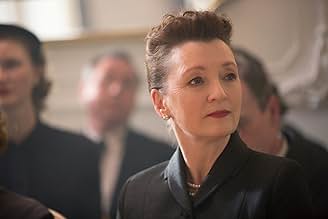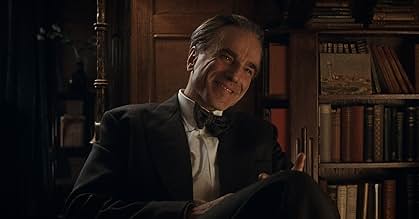Phantom Thread
- 2017
- Tous publics
- 2h 10min
Dans les années 50 à Londres, Reynolds Woodcock est un couturier renommé dont la vie fastidieuse est perturbée par une jeune femme résolue, Alma, qui devient sa muse et sa maîtresse.Dans les années 50 à Londres, Reynolds Woodcock est un couturier renommé dont la vie fastidieuse est perturbée par une jeune femme résolue, Alma, qui devient sa muse et sa maîtresse.Dans les années 50 à Londres, Reynolds Woodcock est un couturier renommé dont la vie fastidieuse est perturbée par une jeune femme résolue, Alma, qui devient sa muse et sa maîtresse.
- Réalisation
- Scénario
- Casting principal
- Récompensé par 1 Oscar
- 55 victoires et 121 nominations au total
Avis à la une
Intimate, delicate, and a beautifully crafted masterpiece. Paul Thomas Anderson manages to expresses an artist's creative journey through threads of fashion and romance with such subtlety that it could only be conveyed through the medium of film. An atmosphere reminiscent of Kubrick's achievements, this romantic odyssey illustrates a unique perspective of love; a perspective in which love is shaped and manipulated by the fragile strings of each character's hearts.
To begin with, I will praise an awfully disregarded aspect of "Phantom Thread": the cinematography and direction. The style and manner in which Paul Thomas Anderson uses silence and long takes is ingenious, and as stated above, was most likely inspired from Kubrick's works. Similar to the quote, "The less you say, the more your words will matter," the more silence, the more each line will signify. The more long takes, the more each short take will signify. Therefore, this method permits a greater control over the variety of dramatic effects; and in turn, the audience's emotions. Anderson also utilized this technique in many of his other films, including "The Master", "Magnolia", and his masterpiece, "There Will Be Blood".
Of course, this strategy doesn't always serve well. The more the audience regards the dialogue, the more engaging the screenplay has to be. The more engaging the screenplay is, the more compelling the performances have to be.
Yet "Phantom Thread" has all of this. Magnificent lead performances by Daniel Day-Lewis and Vicky Krieps, a strong and often overlooked supporting performance by Lesley Manville, and a sharp, dense original screenplay written by Paul Thomas Anderson himself. A few sprinkles of comedy are also blended in the script, which is always valuable for a romance. Not to forget the costume design either, which was essential to establish a post-war 1950s London environment.
And finally, the score. Arguably the strongest part of the film, the score possesses Paul Thomas Anderson's signature strange aura that is found in several of his other films. It's not a coincidence that one of his most frequent collaborators is Jonny Greenwood, who composed the score for this film, "There Will Be Blood", and many others. While most movies nowadays would use music to heighten drama, Paul Thomas Anderson rejects the common norm; valuing music to form an atmosphere. This atmosphere is crucial in almost all of his works, creating an eerie tone for a mystery that drives the story forward.
A transcendental and sublime work of art so remarkably subtle- delicately transfixing the audience ever so slightly, exploring the convoluted depths of an artist's obsession, and expanding cinema's horizons for miles of wonder- all woven beneath the intertwined threads of the phantom.
Farewell, Daniel Day-Lewis. We will miss you.
To begin with, I will praise an awfully disregarded aspect of "Phantom Thread": the cinematography and direction. The style and manner in which Paul Thomas Anderson uses silence and long takes is ingenious, and as stated above, was most likely inspired from Kubrick's works. Similar to the quote, "The less you say, the more your words will matter," the more silence, the more each line will signify. The more long takes, the more each short take will signify. Therefore, this method permits a greater control over the variety of dramatic effects; and in turn, the audience's emotions. Anderson also utilized this technique in many of his other films, including "The Master", "Magnolia", and his masterpiece, "There Will Be Blood".
Of course, this strategy doesn't always serve well. The more the audience regards the dialogue, the more engaging the screenplay has to be. The more engaging the screenplay is, the more compelling the performances have to be.
Yet "Phantom Thread" has all of this. Magnificent lead performances by Daniel Day-Lewis and Vicky Krieps, a strong and often overlooked supporting performance by Lesley Manville, and a sharp, dense original screenplay written by Paul Thomas Anderson himself. A few sprinkles of comedy are also blended in the script, which is always valuable for a romance. Not to forget the costume design either, which was essential to establish a post-war 1950s London environment.
And finally, the score. Arguably the strongest part of the film, the score possesses Paul Thomas Anderson's signature strange aura that is found in several of his other films. It's not a coincidence that one of his most frequent collaborators is Jonny Greenwood, who composed the score for this film, "There Will Be Blood", and many others. While most movies nowadays would use music to heighten drama, Paul Thomas Anderson rejects the common norm; valuing music to form an atmosphere. This atmosphere is crucial in almost all of his works, creating an eerie tone for a mystery that drives the story forward.
A transcendental and sublime work of art so remarkably subtle- delicately transfixing the audience ever so slightly, exploring the convoluted depths of an artist's obsession, and expanding cinema's horizons for miles of wonder- all woven beneath the intertwined threads of the phantom.
Farewell, Daniel Day-Lewis. We will miss you.
PHANTOM THREAD just annihilated me. It's completely worthy of all the immense hype (such as, most cinephiles considering it the best film of 2017). It grows and builds in as organic a manner that a film possibly can. At first, I wasn't sure how I felt - I needed to get to know the characters, then, through most of the movie, I was cracking up at all the tension and the misery between them, then, by the last 10 minutes, I was in tears - a flow of tears which increased each minute as I processed the power and uniqueness and realness of what I had just witnessed. They were "profound" tears. I don't know that I've ever seen a movie that so tastefully glamorizes the toxicity of love. The poison that so many of us romanticize, the poison that we NEED in our lives. There are two types of people in the world: people who feel at home in perfectly "healthy" relationships, and then there's the rest of us. This film is for the rest of us. It stands in a league of it's own. I could never have expected the conclusion - the way that the ribbon is tied, the way the final thread is sewn. It hit me like a bag of bricks. It is all of the pain in love and all of the beauty, all at once. I have never seen this story told before. It's completely original, and completely shattering. The three leads are absolutely astonishing - Daniel Day Lewis and Lesley Manville are terrifying - Vicky Krieps is the most real. The writing and directing is impeccable - P.T. Anderson's legacy continues, it's fire burning brighter than ever. Yes, this is a masterpiece. I am dead.
In early 1950's Britain, Reynolds Woodcock (Daniel Day-Lewis) is the most sought-after dress designer among the rich and powerful. He lives a regimented, almost monastic life, with his watchful sister Cyril (Lesley Manville) as his close associate. One day Reynolds meets waitress Alma (Vicky Krieps) and takes her on as his muse, model, lover, whatever he needs. Alma learns that she's not the first to fill this position in Reynolds' life, but she becomes determined to be the last.
I could care less about the fashion world or Haute Couture, and yet I still was drawn into the single-minded obsessive artistry of Reynolds' world, his strict discipline and pursuit of perfection within his chosen field. Alma acts as an audience surrogate, unsure of this odd world led by the often inscrutable Reynolds and Cyril, the latter of whom often has the charm of an asp. But as Alma begins to see the way things work in this cloistered, rarefied world, she begins to find ways to upset it and bend it to her advantage. Cyril is naturally distrusting of this latest distraction, but Reynolds seems to find something in this new, shaky lifestyle of uncertainty.
The performances are fantastic, with Day-Lewis once laying claim to the title of greatest actor of his generation. He complex, unique yet very real, without a single false note. Manville was also singled out for awards consideration, and she's scary, pitiful, powerful, and voice for order and tradition. Vicky Krieps, a native of Luxembourg, is subtle, sharp, and a match for Day-Lewis as the seemingly simple, unworldly Alma.
The filmmaking is concise and largely unobtrusive, letting the characters do the work, often with silent looks and facial expressions. Director Anderson did not use a Director of Photography on this, instead working with the camera operators themselves. The result is spontaneous but not amateur looking, with a slight gritty haze that makes many scenes almost dream-like. It's not a look that I would like to see in a lot of films, but it works here among the chilly environments both exterior and interior. The score by Jonny Greenwood, guitarist and songwriter from Radiohead, is surprisingly subdued, mainly light piano pieces, with some flourishes when needed.
I won't pretend that a lot of viewers will like this, as they might find it slow, pretentious, boring, or pointless. I certainly did not, and found it a deep, and even deeply disturbing, look at a unique type of love fostered by unusual people, told in a compelling, if quiet, way. This is more for the Masterpiece Theatre crowd than the Fast and the Furious crowd. I would rank this among the very best of the year 2017. Highly Recommended.
I could care less about the fashion world or Haute Couture, and yet I still was drawn into the single-minded obsessive artistry of Reynolds' world, his strict discipline and pursuit of perfection within his chosen field. Alma acts as an audience surrogate, unsure of this odd world led by the often inscrutable Reynolds and Cyril, the latter of whom often has the charm of an asp. But as Alma begins to see the way things work in this cloistered, rarefied world, she begins to find ways to upset it and bend it to her advantage. Cyril is naturally distrusting of this latest distraction, but Reynolds seems to find something in this new, shaky lifestyle of uncertainty.
The performances are fantastic, with Day-Lewis once laying claim to the title of greatest actor of his generation. He complex, unique yet very real, without a single false note. Manville was also singled out for awards consideration, and she's scary, pitiful, powerful, and voice for order and tradition. Vicky Krieps, a native of Luxembourg, is subtle, sharp, and a match for Day-Lewis as the seemingly simple, unworldly Alma.
The filmmaking is concise and largely unobtrusive, letting the characters do the work, often with silent looks and facial expressions. Director Anderson did not use a Director of Photography on this, instead working with the camera operators themselves. The result is spontaneous but not amateur looking, with a slight gritty haze that makes many scenes almost dream-like. It's not a look that I would like to see in a lot of films, but it works here among the chilly environments both exterior and interior. The score by Jonny Greenwood, guitarist and songwriter from Radiohead, is surprisingly subdued, mainly light piano pieces, with some flourishes when needed.
I won't pretend that a lot of viewers will like this, as they might find it slow, pretentious, boring, or pointless. I certainly did not, and found it a deep, and even deeply disturbing, look at a unique type of love fostered by unusual people, told in a compelling, if quiet, way. This is more for the Masterpiece Theatre crowd than the Fast and the Furious crowd. I would rank this among the very best of the year 2017. Highly Recommended.
My Rating : 8/10
This is a delicately executed drama intimately woven around the characters of Daniel Day-Lewis as Reynolds Woodcock and Vicky Krieps as Alma.
Right from the opening shots I was engaged and the brilliant performances, beautiful background music coupled with breathtaking cinematography make this a worthwhile watch if you are in the mood for something slow, something a bit art-y. However if you are not in the mood for something like this it can become a chore to watch so I ask the viewer to understand that it is a very beautiful film and in the right frame of mind you will be absorbed into the world of this renowned mid-twentieth century dressmaker who can be a bit fussy.
Daniel Day-Lewis is at his typical level of brilliance here. He perfectly plays the role of an obsessive personality, who is so averse to letting someone interfere with his work, yet who more and more, through both natural and artificial means, also doesn't want to lose the new woman in his life.
Stylish camera work, wonderfully-paced drama. Solid 8/10.
This is a delicately executed drama intimately woven around the characters of Daniel Day-Lewis as Reynolds Woodcock and Vicky Krieps as Alma.
Right from the opening shots I was engaged and the brilliant performances, beautiful background music coupled with breathtaking cinematography make this a worthwhile watch if you are in the mood for something slow, something a bit art-y. However if you are not in the mood for something like this it can become a chore to watch so I ask the viewer to understand that it is a very beautiful film and in the right frame of mind you will be absorbed into the world of this renowned mid-twentieth century dressmaker who can be a bit fussy.
Daniel Day-Lewis is at his typical level of brilliance here. He perfectly plays the role of an obsessive personality, who is so averse to letting someone interfere with his work, yet who more and more, through both natural and artificial means, also doesn't want to lose the new woman in his life.
Stylish camera work, wonderfully-paced drama. Solid 8/10.
Quiet movies are not usually my thing. I like pace and story and energy. But this film crackles in the quiet. PTA makes every scene feel like a battle, and the actors' performances rise to that challenge. It may be a quiet movie about a dress maker, but it is so much more - a battle of wills, a tension against each seam, a few characters slowly resigning themselves to something other than what they planned. If you described the plot, I would be like, "Really? That is the story?" After watching it, I can say it is not just a story...it is a great story.
Le saviez-vous
- AnecdotesPaul Thomas Anderson got the initial idea for the film while he was sick in bed one day. His wife, Maya Rudolph, was tending to him and gave him a look that made him realize that she had not looked at him with such tenderness and love in a long time.
- GaffesA character says, "I don't mean to be racist..." That word didn't exist, at least in British English, in the 1950s. Someone might have used "racialist".
- Citations
Reynolds Woodcock: Kiss me, my girl, before I'm sick.
- Crédits fousThe typeface used for the credits is called Reynolds Stone and it was created by English wood engraver, typographer, and designer Reynolds Stone, who was a close friend of the parents of Daniel Day-Lewis.
- ConnexionsFeatured in The 75th Annual Golden Globe Awards (2018)
- Bandes originalesMy Foolish Heart
Written by Ned Washington and Victor Young
Performed by Oscar Peterson
Courtesy of The Verve Music Group
Under license from Universal Music Enterprises
Meilleurs choix
Connectez-vous pour évaluer et suivre la liste de favoris afin de recevoir des recommandations personnalisées
- How long is Phantom Thread?Alimenté par Alexa
Détails
- Date de sortie
- Pays d’origine
- Sites officiels
- Langues
- Aussi connu sous le nom de
- El hilo fantasma
- Lieux de tournage
- Victoria Hotel, Station Road, Robin Hood's Bay, Whitby, North Yorkshire, Angleterre, Royaume-Uni(where Reynolds meets Alma)
- Sociétés de production
- Voir plus de crédits d'entreprise sur IMDbPro
Box-office
- Budget
- 35 000 000 $US (estimé)
- Montant brut aux États-Unis et au Canada
- 21 198 205 $US
- Week-end de sortie aux États-Unis et au Canada
- 216 495 $US
- 31 déc. 2017
- Montant brut mondial
- 52 204 454 $US
- Durée
- 2h 10min(130 min)
- Couleur
- Mixage
- Rapport de forme
- 1.85 : 1
Contribuer à cette page
Suggérer une modification ou ajouter du contenu manquant



















